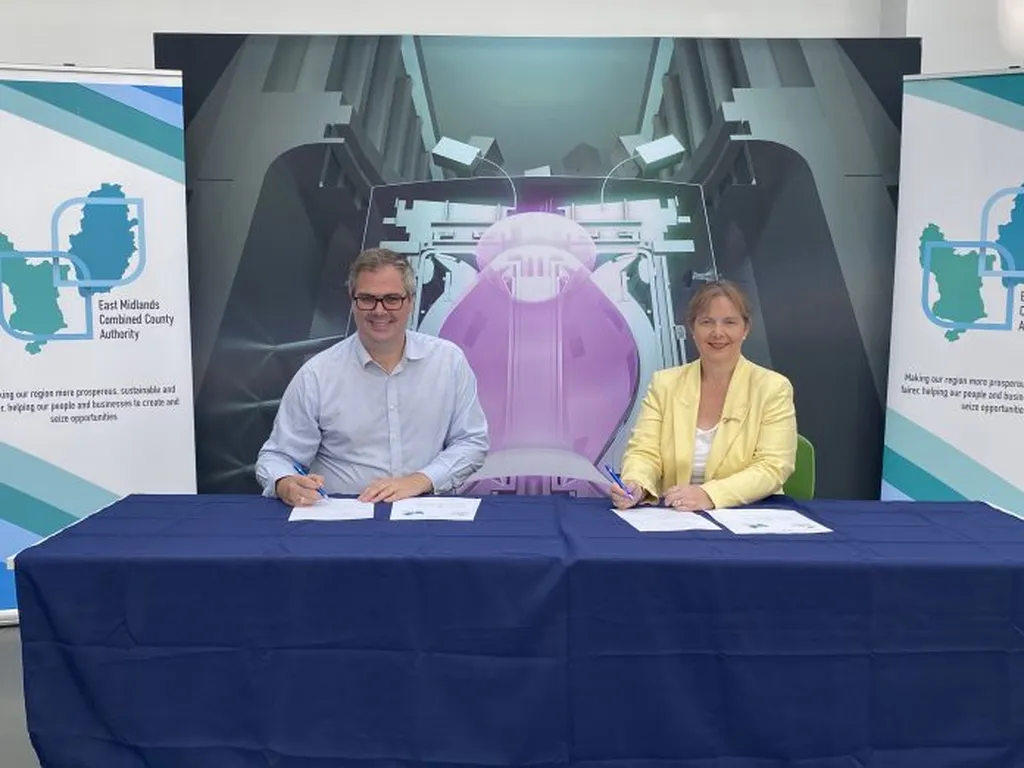The UK Atomic Energy Authority (UKAEA) and the East Midlands Combined County Authority (EMCCA) have joined forces in a 20-year partnership to bolster fusion energy training and skill development. This initiative aims to create a steady stream of highly skilled workers essential for building and operating the UK’s prototype fusion power plant, the Spherical Tokamak for Energy Production (STEP), at West Burton in Nottinghamshire. The collaboration will establish new apprenticeships, vocational programmes, and advanced qualifications to support the ambitious STEP project, a significant step towards commercialising fusion energy.
Nick Walkden, UKAEA’s Head of Fusion Skills and FOSTER Programme Director, expressed enthusiasm about the partnership, stating, “I am delighted to announce EMCCA as our partner in this exciting new training collaboration, which will be delivered out of our planned West Burton Training Facility. People are the most important element of any programme or project. We have listened and learned from other major research, engineering, and infrastructure projects and believe that an early and focused attention to local skills and workforce growth will be a critical enabler to success.”
Fusion energy, long considered the holy grail of clean energy, promises abundant, low-carbon power with minimal environmental impact. The UK, with a £2.5bn government investment, is positioning itself as a global leader in this field. Expanding domestic fusion energy training is crucial to maintaining this leadership. It ensures the UK has the talent needed for projects like STEP and supports a growing export market for British fusion technologies. As the global fusion economy is projected to be worth trillions, investing in skills now is a strategic economic and energy security move.
The STEP programme is expected to catalyse a regional transformation. A recent economic impact study predicts the West Burton site will host around 6,500 full-time jobs once fully operational, accounting for 12.5% of all current workplace jobs in Bassetlaw. The scale and complexity of STEP require a skilled workforce. Estimates suggest nearly half of the construction roles on-site will require Level 3+ qualifications, while around 75% of operational roles will demand Level 4+ qualifications. This demand presents a significant opportunity for the region’s education providers to become leaders in fusion energy training.
Paul Methven, CEO of UK Industrial Fusion Solutions and Senior Responsible Owner of STEP, highlighted the significance of the partnership: “Delivering STEP, and commercial fusion beyond that, will require a strong skills pipeline, not only in STEM subjects, but in every aspect of running a complex business. It is fantastic to see that UKAEA is leading on putting this essential enabler in place now to ensure local people benefit directly from the programme, in addition to ensuring we have the skills needed to deliver STEP.”
Training courses developed through this collaboration will be delivered across the EMCCA region, South Yorkshire, and Greater Lincolnshire, leveraging a strong base of colleges, universities, and skills providers. The programme will adapt over time, reflecting the evolving needs of the STEP project. Initial focus areas include engineering and project management skills to support plant design. In later phases, training will expand to encompass construction and operational disciplines vital for maintaining and scaling the plant. By preparing the workforce now, the region can hit the ground running as construction and operations at the West Burton site ramp up.
Walkden added, “STEP is a programme with global impact and, as with the successive governments who have recognised fusion’s potential to have a significant and positive impact on the nation’s economy, we are equally committed to leaving a lasting local legacy. The training provided will equip people across the East Midlands, Lincolnshire, and South Yorkshire with the skills needed for the prototype fusion powerplant at West Burton as well as long-term career opportunities in fusion and beyond.”
This collaboration represents a catalyst for inclusive growth, green innovation, and long-term job creation in the East Midlands and beyond. By fostering homegrown talent and building robust training pathways, the UK is laying the foundation for a cleaner, more secure energy future powered by fusion. With the right investment in skills and infrastructure, the UK could become the global benchmark for fusion development, and it all begins with fusion energy training today.

